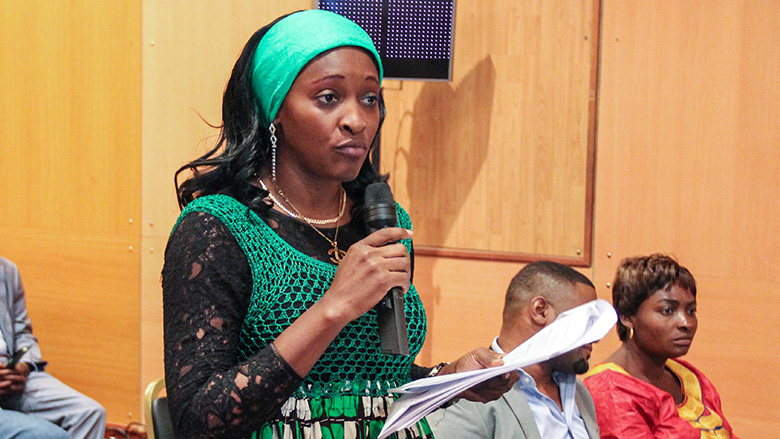YAOUNDE, December 1, 2015 – The World Bank will be preparing a new Country Partnership Framework (CPF) over the next few months, which will be based on a Systematic Country Diagnostic (SCD). The first round of discussions with various stakeholders took place this week in Yaounde, in Douala, and online through social media to help lay the grounds for a new partnership strategy that will guide the World Bank Group’s engagement in the country over the next five years.
The first phase of stakeholder consultations consists of the Systematic Country Diagnostic (SCD), which is expected to stimulate an open and forward-looking dialogue between the World Bank Group (WBG) and the country, with an emphasis on the country’s development agenda rather than the scope of the existing WBG portfolio. Discussions will take place with government officials, civil society, youth, private sector actors, academia, and development partners. Furthermore, online consultations hosted on a dedicated website and the World Bank Cameroon Facebook page are being set up to allow for the participation of online users and provide a sounding board for their development priorities.
The SCD presents a timely and empirical assessment of the constraints a country has to address and the opportunities it can embrace to accelerate progress toward the goals of ending extreme poverty and promoting shared prosperity in environmentally, socially, and fiscally sustainable ways. The SCD draws upon all available information and, where necessary, involves new analysis. It reflects the findings of recently conducted WBG analytical work and also draws upon work from external sources such as other donors and partners, local researchers, and the government. The SCD analysis is not restricted to the areas or sectors where the WBG is currently active but focuses on the critical challenges to achieving the twin goals.
The second phase consists of the preparation of the 2016-2020 Country Partnership Framework (CPF). The CPF is geared towards supporting Cameroon’s development priorities, outlined in the Government of Cameroon’s Growth and Employment Strategic Paper (DSCE), and the institution’s overarching twin goals. The preparation of the CPF will start early 2016 and will incorporate all the stakeholder feedback and input received during the first phase into the draft of the CPF. Once finalized, the CPF will then be officially presented to the World Bank Group’s Board of Directors in April 2016 following multiple discussions with the Government of Cameroon.
“We look forward to listening to input and feedback from various stakeholders on how best we can support Cameroon. We are also very pleased to reach out online via social media platforms such as Facebook to Cameroonians in all regions but also to those living abroad,” said Elisabeth Huybens, World Bank Country Director for Cameroon.
A joint document that combines the strategies of the three World Bank Group institutions – the World Bank, the International Finance Corporation (IFC), and the Multilateral Investment Guarantee Agency (MIGA) – the CPF will build on their respective strengths and areas of expertise.
Currently, the World Bank Group portfolio in Cameroon includes 23 projects for a total commitment of $1.2 billion in fiscal year 2015, including 12 national projects, six regional projects, and five trust funds. World Bank projects deliver benefits to the people of Cameroon in key sectors such as energy, transport, water and sanitation, agriculture, health, and education.
As of November 2015, IFC has seven projects in the pipeline for an estimated commitment of $258.7 million. IFC has focused on supporting companies with the ability to create jobs and boost access to finance for small and medium enterprises. IFC has also worked on promoting regulatory reforms designed to spur economic growth.
MIGA is already active in Cameroon, supporting investments in three power sector projects and one telecom project. The investments in the national electric utility and two existing power generation projects will help meet the growing demand for electricity and improve the overall efficiency and operation of the sector.

